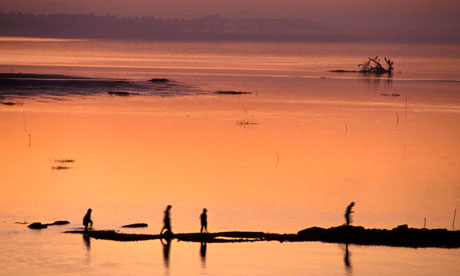I've just arrived in Bangkok for a report on tiger conservation, (more on that later), but the big environment story in south-east Asia this week is without doubt the upcoming decision on the proposed Xayaburi dam in Laos.
I reported last year on the dispute surrounding this project, which poses a risk to some of the world's biggest freshwater fish. Conservationists warn that the 820m barrier threatens catfish the length of cars and stingrays that weigh more than tigers. The Laotian government counters that economic benefits outweigh the environmental impact.
The Mekong River Commission gathers in Vientiane tomorrow to consider the Xayaburi (also spelled Sayabouly) dam. On Friday, they are expected to make a final recommendation to the four member states: Thailand, Laos, Cambodia and Vietnam.
It will be the biggest decision ever taken by the commission, which was set up in 1995 to share the resources of south-east Asia's most important river.
But approval already seems to have been taken for granted. In the past two days, the Bangkok Post and New York Times have reported that residents are being moved out of the area and preparatory work on the dam is already underway. In an editorial headed "Shame on the dam builders", the Post said the approval process had hit an "abysmal low".
"The sham promise to consult and then to decide whether to build Xayaburi should stand as an example of how not to proceed with huge public projects. Authorities involved should be ashamed of misleading their people and civil society."
Serious doubts about the plan persist. The Mekong River Commission's technical reports on the dam admits there is a strong possibility that the giant catfish could become extinct and that fish ladders and other measures were unlikely to prevent risks to the migration patterns of up to 100 species.
"There are no obvious design modifications beyond those proposed that can further mitigate these issues...The potential disruption of downstream migration and drift could have serious ramifications for maintaining the fishery production for this region."
Scientists and environment groups have united to condemn the project. WWF warned the environmental impact assessment was flawed and scientific advice had been ignored.
"WWF fears a much larger scale repeat of the environmental damage of the dam on the Mun River in Thailand, a key Mekong tributary. After similar bland assurances of only low level impacts on fisheries prior to construction, the first decade of the dam's operation saw damaging impacts on 85 per cent of fish species present before the dam's construction, with 56 species disappearing entirely and reduced catches for a further 169 species, according to a World Commission on Dams study."
The potential impact on food security is enormous, warns Aviva Imhof of International Rivers in this opinion piece:
"The Mekong River - known locally as the "Mother of all Rivers" - is the world's largest inland fishery. This fishery constitutes the primary source of protein for the majority of the basin's 60 million inhabitants, many of whom are subsistence farmers. To harm the fishery is to harm the food security of the region's poor."
A coalition of 263 NGOs sent a joint letter to the prime minister of Laos Thongsing Thammavong urging him to reject the plan, but received no response.
They might have been better off addressing it to the premier of Thailand, the country which has most to gain from the project. A Thai construction firm - Ch. Karnchang - will build the hydropower plant. The Thai utility EGAT will buy almost all of the electricity. No surprise then that the Thai government are backing the project on the international stage.
Officials from Cambodia and Vietnam have objected to the plan, which could reduce the water flow needed by their fishermen and paddy farmers. But they too want to build hydropower plants in their own countries.
For Laos, this is just the start. The government wants revenues from hydropower to develop an impoverished nation. If the 1,285 MW plant at Xayaburi goes ahead, it wants to build a cascade of 10 more dams on the Mekong.
China – which has refused to even join the Mekong River Commission - has pressed still further ahead with four huge hydropower projects upstream.
It seems the "Mother of all rivers" is increasingly being milked for power instead of nutrition. Given how much cropland is also now being turned over to biofuels, is it any wonder that the world faces a food crisis.








